Applying themselves now to excel at their futures
March 20, 2018
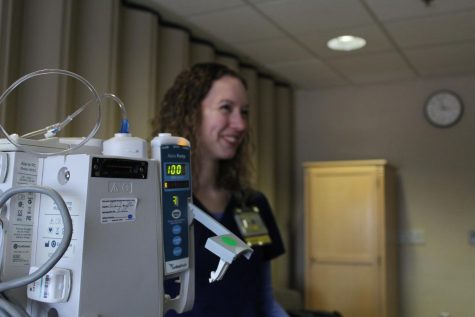
NURSING
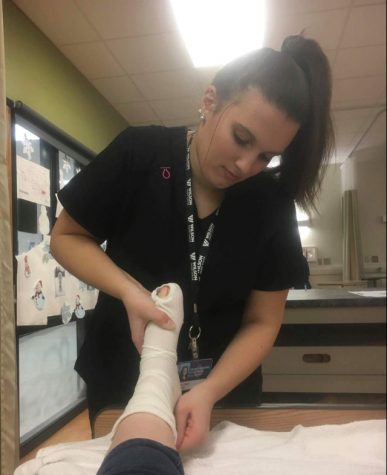
Senior Jenna Casey’s grandpa was in the hospital for a broken hip, but he died of pneumonia and methicillin-resistant Staphylococcus aureus (MRSA), a bacterial skin disease that is resistant to most antibiotics. When Casey found out that her grandpa along with everyone on the same floor obtained these illnesses, she became set on pursuing a career in nursing.
At the Wilson Talent Center’s Health Foundations program, the students learn for two weeks how to wash their hands because cleanliness must be thorough.
“When I found out in Health Foundations about the whole hand-washing thing, that really struck me hard,” Casey said. “I was like ‘alright I’m gonna do this. I’m gonna be the best nurse that I can, and I’m gonna make sure that that doesn’t happen to anyone else’s family.’”
Some students who dream of nursing like senior Kyle Lilley are unable to participate at the nursing programs at the Wilson Talent Center. His enrollment in AP classes and his resolve in sports create a busy schedule for Lilley, yet his desire to find a career in the medical field persists.
Although he was not able to do career center, he managed to find a job shadowing opportunity from Stockbridge graduate Julia Snider at the University of Michigan.
Nursing has always been depicted as strictly a feminine profession. Lilly reported being “called some names” at school for his passion for nursing. Today, the numbers of male nurses has risen significantly, tripling since 1970, from 2.7 to 9.6 percent, according to nurse.org.
“I just don’t care about what other people say,” Lilley said. “Do what you want to do. I want to be an ER nurse, because I am good in stressful situations, and it would be cool to see all of the weird injuries and cases that come in that you might not see in other areas of nursing.”
On February 13, Lilley and senior Madie Gee-Montgomery sought guidance from Snider, who works at the University of Michigan Hospital. The two seniors job-shadowed Snider to get a sense of the kind of work environment they are going to experience in the future.
Gee-Montgomery, who is planning to go to the same university that Snider did realized a few things she needs to work on before applying for nursing school.
“It was exciting just to be there and learn the things that we could from [Snider],” Gee-Montgomery said. Snider “went to Grand Valley and I’m going to Grand Valley, and leaning the best way to get into nursing school there, because it’s really hard. I definitely will have to study more because she didn’t get into the nursing school with two B+’s, and her grades were the reason why she didn’t get in. It put me a lot more on track. I have to do well or else, I might not make it.”
Even though Gee-Montgomery knows she needs to study harder in college, Snider encourages all nursing students to keep pursuing their passions, even if they do not get in at first.
“The need for nurses is always there,” Snider said. “They’re anticipating a shortage. We already need nurses everywhere. Even if you don’t get into the nursing school of your dreams when you want to, or think you are supposed to, you can find other ones, or you can get a degree and then do a second degree program. There’s so many ways to get a nursing degree. It doesn’t always happen when you think it will, the way you think it should.”
AVIATION
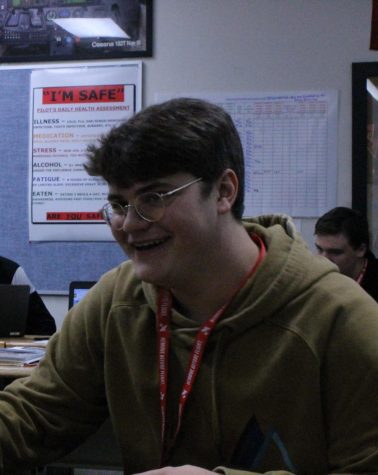
Soaring above the skies is what junior Sammy Drew would like to be doing in the future.
“Well, my dad was a pilot and also I’ve also wanted to fly a plane and go places because I’ve always lived in Stockbridge and I wanna’ explore the world,” Drew said. “My dad just flew for fun and I wanna’ be more international, like going across from country to country, not just like in the United States.”
Drew plans to take a class in Howell that allows her to train and get experience in order to receive a pilot’s license to fly. She also has an idea of getting her flying hours by join the U.S. Air Force.
“Instead of teaching people how to fly, I rather be in the Air Force,” Drew said. “I’d fly around and probably do cargo drop offs and drop off people, too. But, there is the possibility for my glasses to cause problems with that or affecting my training.”
As some students like Sammy would like to head straight toward flying, junior Gabe Millen is currently participating in the aviation training provided by the Wilson Talent Center to pursue his dream to become an aviation engineer.
“When I first heard about the career center having a program, I was really psyched about it, and it was really cool when I first went in. It was just something that prepared me for skills with the aviation aspect and also being professional as well.”
The Wilson Talent Center provides a good learning experience for those like Gabe who are willing to learn aviation skills such as flying or being an airplane mechanic.
Julie Liberti, who teaches the aviation class, prepares students with the knowledge for their future job possibilities in the field of flight.
“We specifically e to becoming a pilot, but that knowledge will transfer to any job a student may pursue,” Liberti said.
Though Millen is learning much from the aviation class, his passion for flight began from the experience he gained when flying airplanes.
“My dad took me to air museums in North Carolina, and also we flew in an A26 bomber, which were the type of planes that flew during the Korean and Vietnam wars and even World War II. It was an actual historical plane and didn’t have its bombing technologies anymore. They striped them away, but it’s called the Spirit of North Carolina. They took me up in it, and I was like, ‘This is sweet.’ Ever since then, I kinda’ had a passion for airplanes.”
ENGINEERING
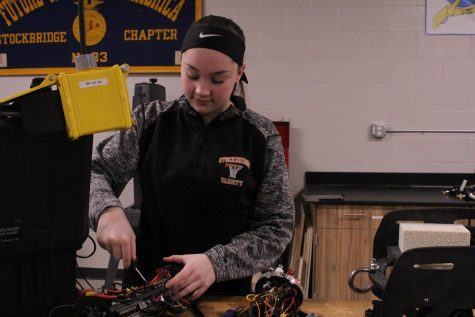
The field of engineering always gets a bad rep from shows like The Big Bang Theory, where main character Sheldon Cooper teases and insults Aerospace Engineer Howard Wolowitz mercilessly. Yet, without people like senior Madi Howard, who aspires to become a biomedical engineer to build prosthetic limbs for amputees, our society’s technological advancements would slow.
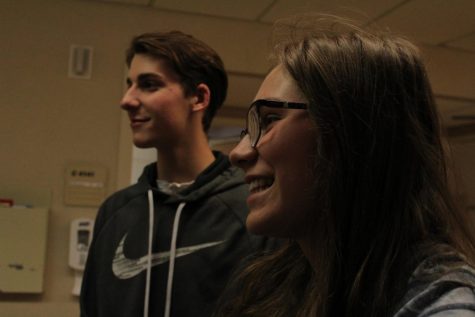
“Engineering involves building things to make people’s lives better. Also it depends on the kind of engineering you want to do. Everything that I would be building would help improve people’s health and making devices that can assist doctors,” Howard said.
Underwater robotics can be a hard class but that there are many solutions to problems.
“It’s always challenging and there’s always a problem you can solve,” Howard said. “It’s not just like a text book answer all the time. It can be frustrating at times if you can’t solve a problem, but normally, it’s easy to figure out a certain issue. It’s also rewarding if you find out what is wrong in the end.”
According to Howard, robotics teacher Robert Richards has been a role model for her personal interest in engineering, and he always likes to challenge the class to keep reaching for their goals.
“We work on a lot of the skills that are required with engineering programs at colleges. More importantly, we have our connections to college engineering programs and people in the industry,” Richards said. “Engineering is more than just making things, it’s a lot of the soft skills and working as a team and they get a chance to do that.”

